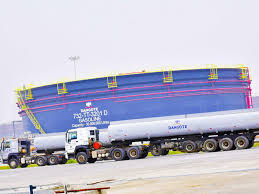Dangote Petroleum Refinery has announced plans to start sending petrol and diesel directly across the country with its own trucks. The move comes at a time when there is a dispute between truck drivers and the Lagos State Government over the E‑Call Up fees on the Lekki–Epe road.
In a statement on Sunday, the company said it will put 4,000 new CNG-powered trucks into service from 15th of August 2025. These trucks will carry Premium Motor Spirit (petrol) and Automotive Gas Oil (diesel) to all parts of the country. The company is also setting up small booster stations and adding more than 100 additional CNG trucks to aid delivery.
Dangote explained that delivery will be free for marketers, filling stations, large businesses, telecom companies, and the aviation industry. The aim is to cut delivery costs and make sure products reach their destination quickly and safely.
The company said this move is part of its plans to cut logistics expenses, use energy more efficiently, and align with the federal government’s policy to grow the Nigerian economy. Furthermore, large buyers who buy 500,000 litres or more will enjoy a credit scheme. According to Dangote, this will help revive inactive filling stations, reduce inflation, and support small businesses across the country.
The announcement came at a challenging time. Truck drivers under the National Association of Road Transport Owners (NARTO) and the Independent Petroleum Marketers Association of Nigeria (IPMAN) are threatening to withdraw their trucks from the road. They say the ₦12,500 E‑Call Up fee per tanker is unfair and should be cut to ₦2,500 per truck instead.
The Lagos State Government responded by defending the fee. It explained that the amount is not for the state coffers but for a private arrangement meant to control the movement of trucks and ease congestion in the area. The state insisted the fund is meant to maintain parks for trucks and provide facilities for drivers. It added that this policy is meant to reduce accidents, ease congestion, and cut down on air pollution in the Lekki corridor.
Some industry experts say this dispute might affect delivery if it is not resolved quickly. If trucks stay off the road, there could be scarcity of products in filling stations, causing prices to rise and adding to the suffering of businesses and ordinary people.
Dangote’s intervention to send its own trucks might ease the pressure. If the company can move products smoothly from its Lekki refinery to all parts of the country, it will help avoid scarcity and keep prices stable.
Lagos plays a key role in businesses in Africa and is home to the Dangote Refinery, Lekki Deep Sea Port, and many industries. The E‑Call Up policy was meant to control the movement of trucks and ease congestion, but many say it has made their operations more expensive.
Some small marketers are worried that this move by Dangote might undermine their businesses and make it hard for them to buy products at reasonable prices. Nevertheless, many say the intervention could help ease delivery problems in the short term and stabilize prices at the pump.
Going forward, it will be important to resolve the dispute over the E‑Call Up fee and find a way forward that works for both the government and the marketers. If this is done, it will avoid disruptions and allow the petroleum industry to operate smoothly.
